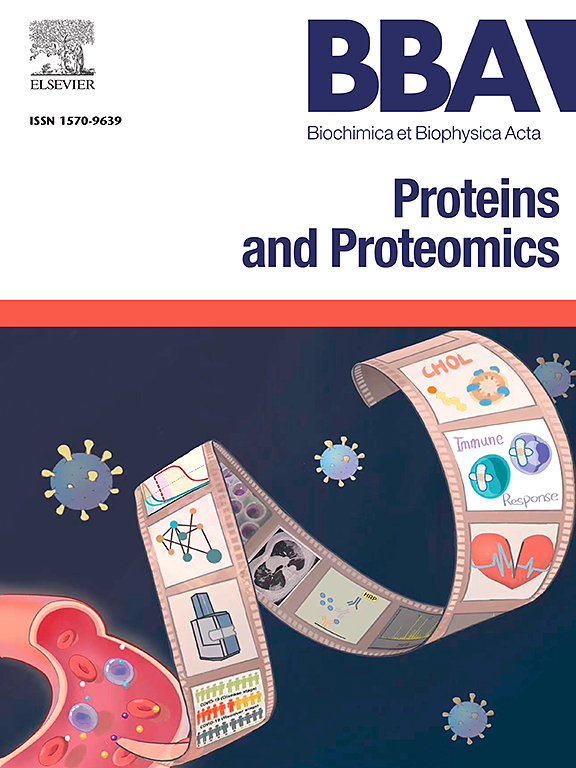Unravelling the phosphoregulatory network of protein kinase C-delta (PKC-δ)
IF 2.3
4区 生物学
Q3 BIOCHEMISTRY & MOLECULAR BIOLOGY
Biochimica et biophysica acta. Proteins and proteomics
Pub Date : 2025-06-02
DOI:10.1016/j.bbapap.2025.141080
引用次数: 0
Abstract
Protein kinase C Delta (PRKCD) is a serine/threonine kinase involved in transcription regulation, cytoskeleton organization, DNA damage response, DNA repair and carcinogenesis. Several PRKCD phosphopeptides are frequently detected to be differentially regulated through mass spectrometry-based phosphoproteomics analysis. Here, we utilize publicly available phosphoproteomics data to decipher phosphoregulatory networks associated with PRKCD. Among 315 phosphoproteomics datasets demonstrating the differential regulation of phosphopeptides of PRKCD, the phosphosites S304, Y313, S645, S299, S302, S664, Y334, Y374, T295 and T507 predominantly represent PRKCD hyperphosphorylation in over 83 % of cases. Further, through co-differential regulation analysis of the predominant sites and associated phosphosites on other proteins, we propose that the autophosphorylation sites S302 and S304 are critically associated with the kinase activity of PRKCD and play a crucial role in modulating its downstream signaling pathways. Compared to known activation sites of PRKCD including Y313, Y334 and Y374, the sites S302 and S304 coregulated the most with the experimentally validated and predicted substrates. Besides that, phosphosites Y313, Y334 and Y374 are associated with stress signaling and cancer progression. Current study focuses on critical kinase-activation associated with phosphosites in kinases. This study highlights the sites S302 and S304 as activation sites and as key players in various cellular processes including cell cycle regulation, motility, adhesion and migration. Our approach and the stringent criteria adopted sets a robust platform to analyze differentially regulated phosphoproteome data in diverse biological contexts to interpret the predominant phosphosites, their co-regulation and the overall biological relevance of such regulation in pathophysiological processes.
蛋白激酶c -δ (PKC-δ)磷酸化调控网络的揭示
蛋白激酶C δ (PRKCD)是一种丝氨酸/苏氨酸激酶,参与转录调节、细胞骨架组织、DNA损伤反应、DNA修复和癌变。通过基于质谱的磷酸化蛋白质组学分析,几种PRKCD磷酸肽经常被检测到差异调节。在这里,我们利用公开可用的磷蛋白质组学数据来破译与PRKCD相关的磷调控网络。在315个显示PRKCD磷酸化肽差异调控的磷酸化蛋白质组学数据集中,超过83%的病例中,磷酸化位点S304、Y313、S645、S299、S302、S664、Y334、Y374、T295和T507主要代表PRKCD过磷酸化。此外,通过对其他蛋白上的优势位点和相关磷酸化位点的共差异调控分析,我们提出自磷酸化位点S302和S304与PRKCD的激酶活性密切相关,并在调节其下游信号通路中发挥关键作用。与已知的PRKCD激活位点Y313、Y334和Y374相比,S302和S304位点与实验验证和预测的底物的共调控作用最大。此外,磷酸基Y313、Y334和Y374与应激信号和癌症进展有关。目前的研究主要集中在与激酶中磷酸位点相关的关键激酶活化。本研究强调S302和S304位点是激活位点,在包括细胞周期调节、运动、粘附和迁移在内的各种细胞过程中起关键作用。我们的方法和采用的严格标准设置了一个强大的平台来分析不同生物学背景下差异调节的磷蛋白质组数据,以解释主要的磷位点,它们的共同调节以及这种调节在病理生理过程中的整体生物学相关性。
本文章由计算机程序翻译,如有差异,请以英文原文为准。
求助全文
约1分钟内获得全文
求助全文
来源期刊
CiteScore
8.00
自引率
0.00%
发文量
55
审稿时长
33 days
期刊介绍:
BBA Proteins and Proteomics covers protein structure conformation and dynamics; protein folding; protein-ligand interactions; enzyme mechanisms, models and kinetics; protein physical properties and spectroscopy; and proteomics and bioinformatics analyses of protein structure, protein function, or protein regulation.

 求助内容:
求助内容: 应助结果提醒方式:
应助结果提醒方式:


